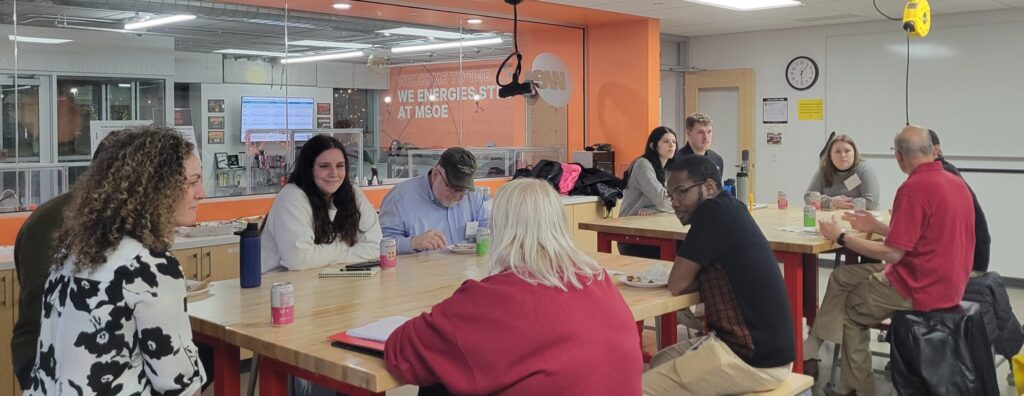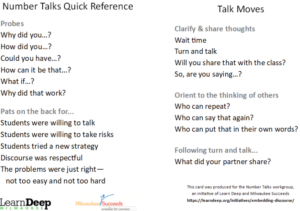 After a break in January, our Collab Lab Series resumed last night with a session focused on dealing with setbacks and recognizing wins.
After a break in January, our Collab Lab Series resumed last night with a session focused on dealing with setbacks and recognizing wins.
Challenges
Began the discussion with an inventory of the challenges and setbacks students face when they work together on open ended projects. These challenges primarily revolve around:
Expectations
- Focus on grades
- Belief that their voice won’t matter
- Opposing wants — freedom vs control
- Expectations are unclear
An ability to deal with uncertainty
- Lack of confidence
- Being open to the idea that there is no one right answer
- Aversion to risk/failure
Communication & collaboration
- Inability for team members to agree on a common approach
- Ability to deal with personality conflicts within a team
- Ability to give and receive constructive criticism
- Lack of accountability
- Lack of feedback
Project structure
- Project lacks structure that would allow students to make progress
- Space/time to iterate
- Access to resources necessary to effectively take on the challenge
Skills
- Ability to arrive at a good definition/understanding of the problem at hand
- Time management
- Need for higher level thinking skills
Strategies
In our second round, our discussion shifted to look at strategies to help students address each of these challenges.
Expectations
- Set clear expectations with examples
- Set up an environment with clear expectations for communication, collaboration, willingness to learn from things that did not go as expected.
Dealing with uncertainty
- Students have repeated opportunities to immerse themselves in the challenge and circle back with their teacher for input and guidance
- Acknowledge big feelings to help understand that “failure” is not personal
Communication & collaboration
- Understand the context of students life beyond school and what they may need to work effectively with peers
- Small, frequent check-ins
- Create time/space for purposeful reflection
Project Structure
- Students are given a clear view of the process they will follow to arrive at a solution even if they can’t yet see where it might lead
- Decompose challenge into smaller pieces
- Structure challenges students to stretch at each step of the process, but those steps are within reach, and build on each other
- Connect students with what they need when
- Repeated opportunities to practice and develop skills within the context of the project
Skills
- Both students and teachers are equipped with the skills they need/supported in their development of those skills
- Skills required build on those already acquired
A Simple Tool
 With this inventory in hand, we recounted the story of the Number Talks Quick Refence Card that was developed out of a project we did with K-12 teachers and UWM Math faculty. That project supported teams of teachers who wanted to establish Number Talks as a regular practice in their elementary school classrooms. Though teachers could clearly see the value of the practice, it was something new, so they wanted something that could rely on to help keep them on the right path. One of the teachers suggested a small card of reminders that should could hold and glance down at while working with students. The card we developed includes three sections: Talk Moves (strategies), Probes (questions to ask), and Pats on the Back (signs that things are working).
With this inventory in hand, we recounted the story of the Number Talks Quick Refence Card that was developed out of a project we did with K-12 teachers and UWM Math faculty. That project supported teams of teachers who wanted to establish Number Talks as a regular practice in their elementary school classrooms. Though teachers could clearly see the value of the practice, it was something new, so they wanted something that could rely on to help keep them on the right path. One of the teachers suggested a small card of reminders that should could hold and glance down at while working with students. The card we developed includes three sections: Talk Moves (strategies), Probes (questions to ask), and Pats on the Back (signs that things are working).
As the final exercise of the night, we asked each of our discussion groups to develop their own Quick Reference Cards for open ended projects. Here’s what they came up with:
Group 1
Moves
- Give yourself time
- Accept “I don’t know”
- Build personal connections
- You’ve got this
- Accept congratulations
Probes
- Tell me more…
- How might we…?
Pats on the Back
- I was afraid to try this but I did anyway
Group 2
Moves
- Yes, and?
- Build community
- Set Goals
- Normalize failure
Probes
- What did we learn?
- What is your why?
- What makes you uncomfortable?
- What do you bring to the team?
- How might we…?
Pats on the Back
- Unprompted reflection
Group 3
Moves
- Are students in the right groups?
- What does this student need?
- How is my relationship with this student?
Probes
- How will you define success?
Pats on the Back
- Students are engaged
- Students are gaining essential skills
- Students give and receive feedback
- Students get the feedback they need
- Students move from “I” to “we”
Thanks again to our Featured Participants:
- PJ Dever — Executive Director for Playworks in Wisconsin
- Lana M. Minshew — Assistant Professor, Director of the Human-Centered Design Lab at the Medical College of Wisconsin
- Nina Johnston — Program Manager of the Human-Centered Design Lab at the Medical College of Wisconsin
A big thanks also goes out to Anthony, Audrey, Connor, Olivia, & Madeline, Architecture students at UWM. They are joining us this semester for Collab Labs and other sessions we run at the STEM Center as part of service learning field experience for Arch 302. In another example of 1 + 1 = 3, The students gain a field experience as they look at the design of learning spaces (in this case the STEM Center), we get help setting things up and cleaning up after each session, and our Collab Lab participants get the perspective of 5 individuals not far removed from K-12 who find themselves navigating open-ended, collaborative, community-engaged projects.
Thanks also to MSOE’s STEM Center for hosting the Collab Lab Series, as well as the students from Pathways High School and Bradley Tech who joined in person/on Zoom.

